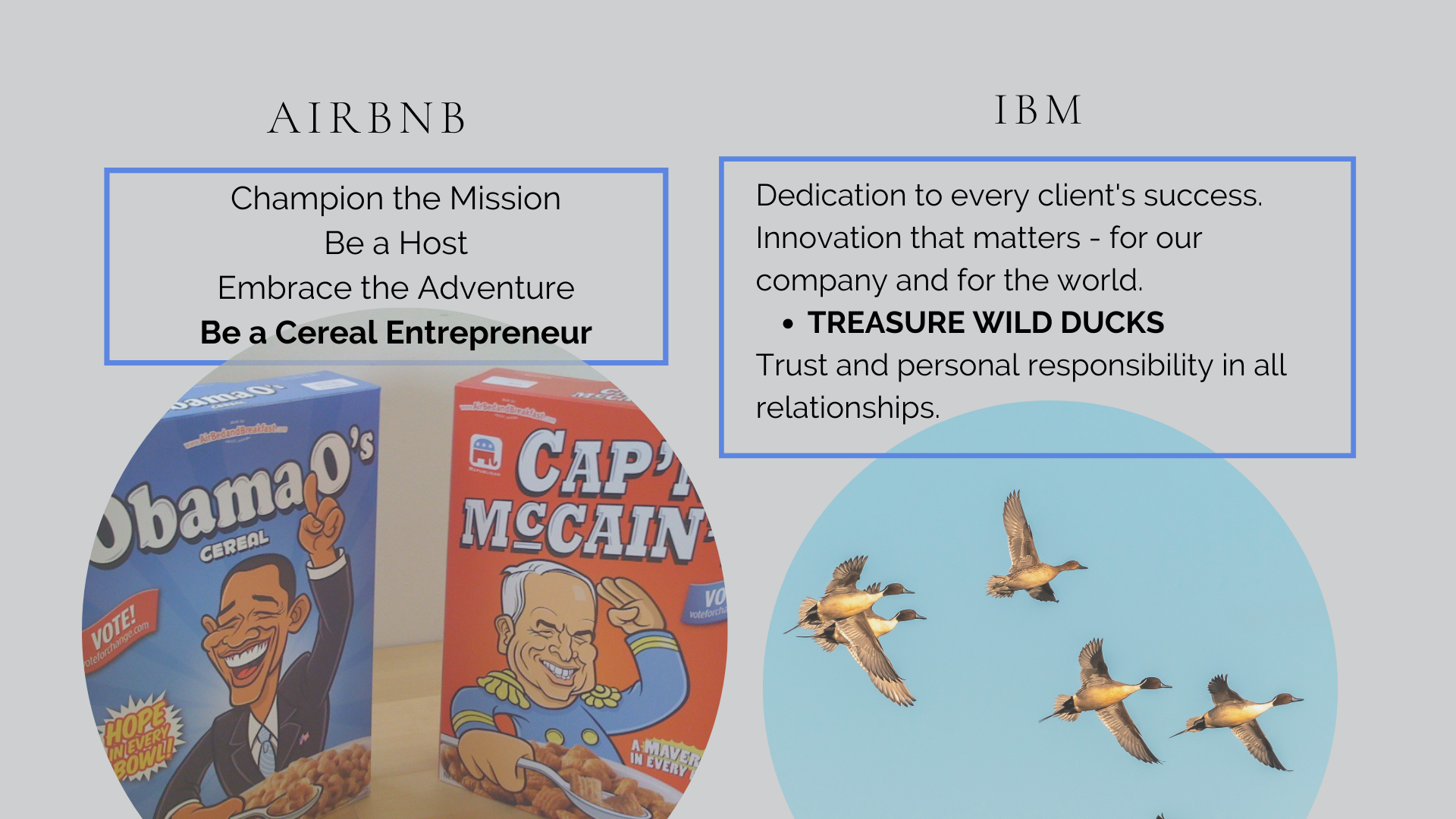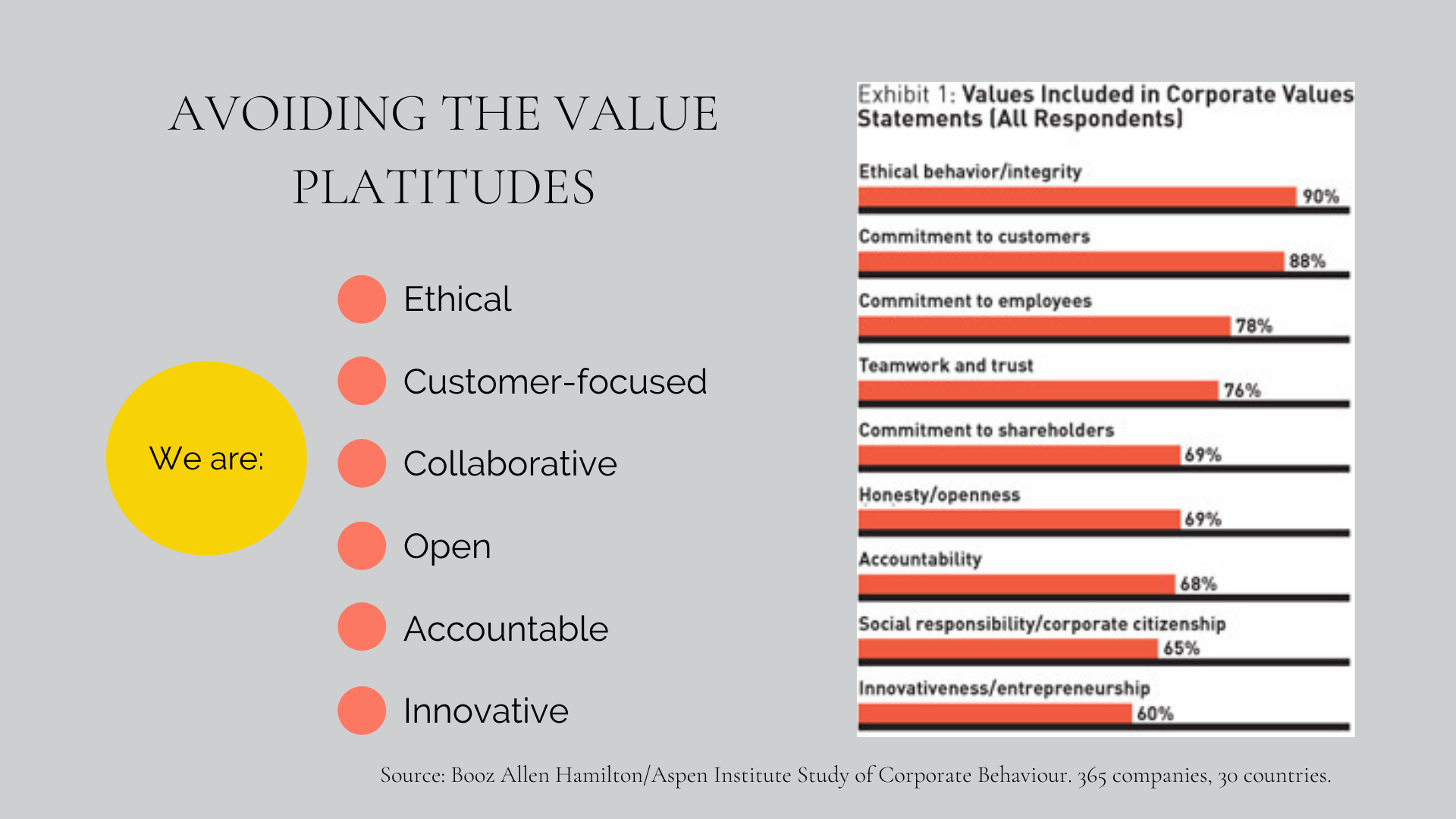Developing Core Values That Create Winning Brands

One of my brand strategy clients, The Berkeley, won The Cateys this month - what they call "The Hotel Oscars".
The Berkeley hotel stands out in the crowded field of luxury hotels in London because they really know what they stand for. Part of the work we did together was to codify WHO they are and HOW they do things - what many companies call values, but they call 'The Berkeley Spirit'.
When we wrote the words under The Berkeley Spirit, one of the phrases we used, that we debated for a while, is the idea of having the ‘freedom to break the rules’.
Now, in luxury hoteliery they get measured. A lot. By many outside organisations trying to rank them on things like, 'Did they answer the phone in 3 rings?'. 'Is the knife half an inch from the side of the plate?' On the details that constitute excellence - or so these companies say.
So telling their staff that they have the freedom to break the rules was a courageous move. But a winning one. It allows their staff to think about the conventions in the category and which ones they want to break to stand apart.
How values lead to winning behaviours
The Berkeley are one of the most exclusive hotels in London (their suites can easily command £16,000 per night) and yet during the past year they've created casual beach huts outside their hotel, selling hot dogs and ice cream cones. They created a breakfast-in-bed delivery service, and pedalled Blue Bar bikes offering cocktails mixed on your doorstep. They've run hula hooping classes on the roof, and their Prêt-à-Portea afternoon tea was the first to break the conventions of what afternoon tea at a luxury hotel should look like.
They have broken all the typical ‘rules’ on what luxury hotels should and should not do, and have triumphed because of it.
During the past 18 months all hotels have been severely tested, but the team at The Berkeley truly rose to the challenge. Instead of retrenching, being more cautious, putting their brand and their spirit on the backburner, they embraced another one of their core values: “always lend a helping hand’ and have “emerged as one of London's hero properties.”
When COVID-19 first forced The Berkeley to close, the London hotel transformed its façade into the 999 Drive Thru, serving 500 meals daily to emergency workers and 250 meals a day to elderly and vulnerable community members. (Earning the inaugural Philanthropic Star Award from Forbes Travel Guide, as well as Hotel of the Year from The Cateys).
Staff helped out at vaccine centres, and an intranet was created so everyone could share lockdown stories, videos and masterclasses. They've been handing out bacon and egg sandwiches to the emergency services: moving the Bentleys and Ferraris so police cars and ambulances can drive up and grab a bite. And this initiative has been extended, indefinitely, to continue to lend that helping hand the first Wednesday of every month, along with The Berkeley Blue Lights Club, a program for emergency services personnel that entitles the heroes to hotel benefits and treats.
Without being courageous in defining and then truly living their values, these category-breaking initiatives wouldn't have occurred.
As the judges of the Cateys noted:
2020 was the most humbling and challenging year for the entire sector, but some businesses used this as motivation. The creativity and team spirit shown by the Berkeley set it apart. - Gareth Banner
Throughout the pandemic the dedicated team, under the leadership of general manager Knut Wylde, threw away the rule book and went well beyond the call of duty. Their daily commitment, sensitivity and innovation to support frontline heroes were an inspiration to the whole industry. - Harry Murray
Bravo to the wonderful team there.
So what can you learn from this when you're writing your core values?
How to write meaningful core values
First – you’ve got to work hard to write core values that are courageous.
It’s an opportunity to proclaim what you stand for and stand against. That means going beyond the wafer-thin and facile terms you currently espouse and find the unique truth you unambiguously hold dear inside your company. If you don’t fully articulate the values and behaviours you need to drive your strategic success, that’s not a failure of intellect, it’s a failure of courage.
But what does being courageous with your values really mean?
Well, it doesn't always mean writing something that takes courage to act upon. Like having the ‘freedom to break the rules’ from The Berkeley. It can also mean writing something that is thought-provoking, direct, or requires some deeper explanation.
Sometimes that means writing a phrase that isn't easily understood at first glance.

“But our team in xxx country won’t understand that word…”, is not a good reason to default to boring platitudes that don’t make a difference to how people think or act every day. Instead of dumbing things down, take the time to explain it. Because then you can engage employees in a meaningful story.
Just like Airbnb's value - 'Be a cereal entrepreneur'.
Why is this great?
Because it doesn't just tell employees what's expected of them, it opens the door to a founding story. This is no spelling mistake, it’s a very clever way of writing a corporate value that helps to explain what led to their success and the type of entrepreneurial spirit that will continue to help them grow.
Or IBM's 'Treasure wild ducks.
Because it connects employees to the company heritage through a Dutch parable Thomas Watson, Jr. liked to tell, and talks about how to be innovative in a distinctive and memorable way.
As Curt Steinhorst writes in Rethinking the value of Core Values:
The path to success is to focus first on the stories your people and your customers tell about your company and share with one another. What is celebrated, what draws attention, what does “everyone” care about? What tales are modern legends in your company? Where does your organization find its pride, or its shame? Its hope, or its despair? Its honor and its humanity?
I also love Google’s 'Focus on the user and all else will follow’, one of their ‘Ten things we know to be true’, because it works as a mantra that adorns office walls. Literally.
The core values you need to avoid
Being courageous also requires you to fight against the generic corporate list of values most companies default to using. You have to work hard to create values that are authentic, engaging and meaningful.
If your list of values read something like: We are 'innovative', 'ethical', ‘customer-focused', ‘collaborative’, ‘open’ and ‘accountable’ then you need to revisit them.
A Booz Allen Hamilton/Aspen Institute study across 365 companies and 30 countries showed that 90% of organisations mention integrity, 76% trust and teamwork, 69% honesty and openness, 68% accountability, 60% innovative/entrepreneurial.
And a HBR study showed that 55% of all Fortune 100 companies claim integrity is a core value, 49% espouse customer satisfaction, and 40% tout team-work.

Why does this matter? In the words of Patrick Lencioni in 'Make Your Values Mean Something' in Harvard Business Review,
Most values statements are bland, toothless, or just plain dishonest. And far from being harmless, as some executives assume, they’re often highly destructive. Empty values statements create cynical and dispirited employees, alienate customers, and undermine managerial credibility… Coming up with strong values—and sticking to them—requires real guts. Indeed, an organization considering a values initiative must first come to terms with the fact that, when properly practiced, values inflict pain.
Don’t just repeat category-generic, cost-to-play values, work hard to express what makes you uniquely you.
If you MUST use one word to encapsulate each value, then make sure that you express more uniquely how this manifests in your organisation. Take IKEA’s definition of their value of Simplicity for example:
‘A simple, straightforward and down-to-earth way of being is part of our Smålandic heritage. It is about being ourselves and staying close to reality. We are informal, pragmatic and see bureaucracy as our biggest enemy.’
Where to start to write compelling values
But before you start rewriting all your values in a more unique, active and actionable way consider the context they need to sit within.
Understand what they should be helping you to do.
They should never be developed in isolation. Values are a way of explaining HOW you need to act and WHO you need to be in order to achieve your purpose or mission – WHY your company exists.
They are part of your overall brand strategy, not something that HR should develop one year unrelated to the purpose the CEO and Marketing develop the next.
Take SAP’s for instance. They have 5:
- Tell it like it is
- Stay Curious
- Embrace differences
- Keep the promise
- Build Bridges, not silos
These are simple, actionable, memorable AND they are explained as 'How we Run' - which links to WHY they exist - To help businesses run better.
(It's astounding how so many companies create no link between WHY they exist and HOW they do things, creating these statements separately, led by separate teams. For more on how these all link together jump into my free course, Brand Strategy in 7 Simple Steps).
Finally, once you’ve got to your list then take a long HARD look at them. And determine whether you really do behave in the ways your values profess.
Denise Lee Yohn, in her book 'Fusion, How Integrating Brand and Culture Powers The World's Greatest Companies', highlights three core ways to do this, from work by Professor de Chernatony.
You need to examine them for three inconsistencies:
Action inconsistency
Your company says one thing but doesn’t support it with actions.
Example: Your company’s leaders constantly talk about the importance of customers but they reject an opportunity to reduce customer complaints because of the cost involved.
Symbolic inconsistency
Your company promotes a value externally but doesn't appear to authentically live it internally. Example: Your company runs a healthy grocery store chain, but the vending machines in the employee breakroom are stocked with junk food.
Ideological inconsistency
Your company claims to take an ideological stands on an issue then behaves contrary to that stand. Example: Your company is an investment firm that claims a policy of ethical investments but accepts an invitation to consult with a company with human rights violations.
As The Berkeley have shown over the past year, when you’re consistent with your values – when your ideology, symbolism and actions are in synergy, you can triumph even during the hardest of times.
If you need more help, I teach exactly how to develop winning values for any brand in Brand Strategy Academy. Would love to see you in there!
Liked this? Then you'll love this:
Brand Strategy in 7 Simple Steps
A free mini course that gives you a clear brand strategy framework based on 20+ years of experience.
Four short lessons, no cost, jargon-free.
By clicking submit, you agree to receive marketing emails from Brand Strategy Sarah about our products and services. Unsubscribe at any time.

